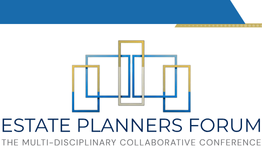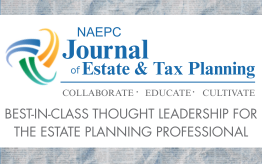July, 2014 Newsletter
Provided by Leimberg Information Services
See other issues.
Bruce Steiner & Revenue Procedure 2014-18: Extension of Time for Some Estates to Elect Portability
“Since portability is new, some executors and their attorneys may not have been aware of it, or may not have been aware of the need to file an estate tax return to elect it. In the case of a same sex married couple, the Service did not recognize their marriage until the Supreme Court decision in Windsor in 2013. By that time, the due date for filing the Federal estate tax return to elect portability may have expired.
In some states, such as New York and New Jersey, a Federal QTIP election or nonelection is binding for state estate tax purposes. There is some uncertainty as to whether a wholly unnecessary QTIP election is void or voidable. In the case of an estate not required to file a Federal estate tax return, the executors may have opted not to file a Federal estate tax return, to insure the availability of the QTIP election for state estate tax purposes.”
We close the week with Bruce Steiner’s observations on Revenue Procedure 2014-18.
Bruce D. Steiner, of the New York City law firm of Kleinberg, Kaplan, Wolff & Cohen, P.C., and a member of the New York, New Jersey and Florida Bars, is a long time LISI commentator team member and frequent contributor to Estate Planning, Trusts & Estates and other major tax and estate planning publications. He is on the editorial advisory board of Trusts & Estates, and is a popular seminar presenter at continuing education seminars and for Estate Planning Councils throughout the country. He was named a New York Super Lawyer in 2010, 2011, 2012 and 2013.
Bruce has been quoted in various publications including Forbes, the New York Times, the Wall Street Journal, the Daily Tax Report, Lawyers Weekly, Bloomberg’s Wealth Manager, Financial Planning, Kiplinger’s Retirement Report, Medical Economics, Newsday, the New York Post, the Naples Daily News, Individual Investor, Fox Business, TheStreet.com, and Dow Jones (formerly CBS) Market Watch.
Here is his commentary:
EXECUTIVE SUMMARY:
Revenue Procedure 2014-18 extended the time until December 31, 2014, for estates of decedents dying in 2011, 2012 and 2013 to elect portability if they were not required to file a Federal estate tax return.
FACTS:
The Tax Relief, Unemployment Insurance Reauthorization, and Job Creation Act of 2010 (“TRUIRJCA”) introduced the concept of portability, effective for decedents dying after 2010.
Under portability, if the deceased spouse’s executors so elect, the deceased spouse’s unused exclusion amount (the “DSUE amount”) becomes available to be applied to subsequent transfers by the surviving spouse, either during lifetime or at death.
Portability was scheduled to expire at the end of 2010. However, the American Taxpayer Relief Act of 2012 (“ATRA”) made portability permanent.
A portability election must be made on a timely filed estate tax return.
In Windsor v. United States, the Supreme Court held that Section 3 of the Defense of Marriage Act, which defined marriage as between persons of different sexes, was unconstitutional.
Prior to the Supreme Court decision in Windsor, the Internal Revenue Service did not treat a same sex surviving spouse as a spouse for estate tax purposes.
After the Supreme Court decision in Windsor, the Service issued Revenue Ruling 2013-17, which treats a same sex spouse as a spouse for tax purposes if the marriage was valid in the state where the parties were married.
Revenue Ruling 2013-17 is prospective as of September 16, 2013. However, taxpayers may amend their returns for open years based on the ruling if they wish to do so.
In Rev. Proc. 2014-18, the Service granted an extension of time until December 31, 2014, to estates of decedents dying in 2011, 2012 and 2013 to elect portability if they were not required to file a Federal estate tax return.
COMMENT:
Since portability is new, some executors and their attorneys may not have been aware of it, or may not have been aware of the need to file an estate tax return to elect it.
In the case of a same sex married couple, the Service did not recognize their marriage until the Supreme Court decision in Windsor in 2013. By that time, the due date for filing the Federal estate tax return to elect portability may have expired.
In some states, such as New York and New Jersey, a Federal QTIP election or nonelection is binding for state estate tax purposes. There is some uncertainty as to whether a wholly unnecessary QTIP election is void or voidable. In the case of an estate not required to file a Federal estate tax return, the executors may have opted not to file a Federal estate tax return, to insure the availability of the QTIP election for state estate tax purposes.
If an estate is required to file a Federal estate tax return, the due date for electing portability is statutory. The Service cannot extend it beyond the period for which it can extend the time for filing the return.
However, if an estate is too small to be required to file a Federal estate tax return, the due date for electing portability is fixed by regulation, and not by statute.
The Service has issued several private letter rulings granting an extension of time to elect portability where a Federal estate tax return was not required.
Rev. Proc. 2014-18 grants an extension of time until December 31, 2014, to elect portability to all estates of United States citizens or residents who died in 2011, 2012 and 2013 and did not file a timely estate tax return.
To elect portability, the estate must file a Federal estate tax return by December 31, 2014. The return must say “FILED PURSUANT TO REV. PROC. 2014-18 TO ELECT PORTABILITY UNDER §2010(c)(5)(A).”
If it is later determined that the estate was required to file a Federal estate tax return, then the relief will be null and void.
If the spouse has paid gift tax, or the spouse’s estate has paid estate tax, then the spouse, or the spouse’s estate, can file a refund claim within the statute of limitations, which is three years from filing the return, or two years from the payment of the tax (limited to the tax paid within the preceding two years).
Pending ruling requests can be withdrawn, in which case the Service will refund the user fee.
This relief will be useful in several situations:
Estates that neglected to elect portability.
Estates of decedents with same-sex surviving spouses where the estate could not elect portability prior to the Supreme Court decision in Windsor.
Estates of decedents in states such as New York or New Jersey where a Federal QTIP election or nonelection is binding for estate tax purposes, that were concerned that a Federal QTIP election might be void, and sacrificed portability to be certain that they could make a QTIP election for state estate tax purposes. If, by December 31, 2014, the Service clarifies Rev. Proc. 2001-38 such that a wholly unnecessary QTIP election is voidable rather than void, these estates may want to file a Federal estate tax return to elect portability.
Concluding Observation
Eligible estates of married persons dying in 2011, 2012 or 2013 that did not elect portability should consider whether to take advantage of Rev. Proc. 2014-18 and elect portability by December 31, 2014.
HOPE THIS HELPS YOU HELP OTHERS MAKE A POSITIVEDIFFERENCE!
Bruce Steiner
CITE AS:
LISI Estate Planning Newsletter #2224 (May 15, 2014) athttp://www.LeimbergServices.com Copyright 2014 Leimberg Information Services, Inc. (LISI). Reproduction in Any Form or Forwarding to Any Person Prohibited – Without Express Permission.
CITES:
American Taxpayer Relief Act of 2012 (P.L. 112-240, H.R. 8, 112th Cong., 2d Sess.), § 101.; Tax Relief, Unemployment Insurance Reauthorization, and Job Creation Act of 2010 (P.L. 111-312), §§ 302-304; Internal Revenue Code Sections 2010(c) and 6018(a); Treas. Reg. §§ 20.2010-2T(c) and 301.9100-3;Windsor v. United States, 570 U.S. ___ (2013); Rev. Rul. 2013-17, 2013-38 IRB 20; Rev. Proc. 2014-18; Rev. Proc. 2001-38, 2001-1 C.B. 1335; TSB-M-11(9)M (N.Y. State Dept. of Taxation and Finance, July 29, 2011); Letter dated January 31, 2011, from Fred M. Wagner III, Assistant Chief, Individual Tax Audit Branch, New Jersey Division of Taxation, to Robert D. Borteck,reprinted in Practical Drafting at 10462 (April 2011).
All NAEPC-affiliated estate planning councils are eligible to receive a discounted subscription rate to the Leimberg LISI service. Please see more information about the offering. You may also contact your local council office / board member to find out whether they are offering the service as a member benefit.





